

Irish Soma. Many scholars believe that the Indo-Europeans used an entheogenic or psychedelic drug in their rituals -- called soma amongst the Vedic people of India, and haoma in Iran.
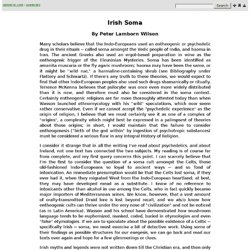
The ancient Greeks also used an ergot-based preparation in wine as the entheogenic trigger of the Eleusinian Mysteries. Soma has been identified as amanita muscaria or the fly agaric mushroom; haoma may have been the same, or it might be "wild rue," a harmaline-containing shrub (see Bibliography under Flattery and Schwartz). If there's any truth to these theories, we would expect to find that other Indo-European peoples also used such drugs shamanically or ritually. Terrence McKenna believes that psilocybe was once even more widely distributed than it is now, and therefore must also be considered in the soma context. Certainly entheogenic religions are far more thoroughly attested today than when Wasson launched ethnomycology with his "wild" speculations, which now seem rather conservative. St. LUGHNASA. © Anna Franklin Lughnasa, make known its dues, In each distant year: Tasting every famous fruit, Food of herbs at Lammas Day.
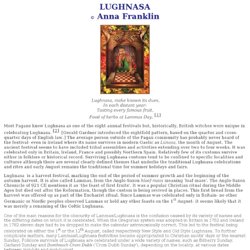
Most Pagans know Lughnasa as one of the eight annual festivals but, historically, British witches were unique in celebrating Lughnasa. Hekate - Section B - Encyclopedia Thelemica. Back to Hekate - Section A Cult The oldest reference about Hekate in poetry is found in Hesiod's Theogony, while an inscription from late archaic Miletus naming her as a protector of entrances attest for her presence in archaic Greek religion. [2] Regarding the nature of her cult, it has been remarked, "she is more at home on the fringes than in the center of Greek polytheism.
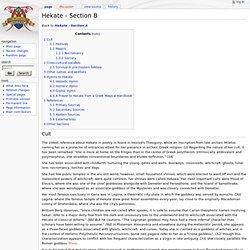
Intrinsically ambivalent and polymorphous, she straddles conventional boundaries and eludes definition. " [18] She has been associated with childbirth, nurturing the young, gates and walls, doorways, crossroads, witchcraft, ghosts, lunar lore, necromancy, torches and dogs. She had few public temples in the ancient world, however, small household shrines, which were erected to ward off evil and the malevolent powers of witchcraft, were quite common; her shrines were called Hekaea. It is to be noted that Hekate plays little or no part in mythological legend. Festivals (see: Hecate - Section D – Quotations VI) Magick H. Hecate. Ancient Greek goddess of magic and crossroads Hecate was one of the main deities worshiped in Athenian households as a protective goddess and one who bestowed prosperity and daily blessings on the family.[5] In the post-Christian writings of the Chaldean Oracles (2nd–3rd century CE) she was regarded with (some) rulership over earth, sea, and sky, as well as a more universal role as Savior (Soteira), Mother of Angels and the Cosmic World Soul.[6][7] Regarding the nature of her cult, it has been remarked, "she is more at home on the fringes than in the center of Greek polytheism.
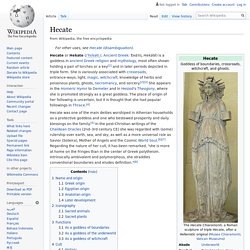
Intrinsically ambivalent and polymorphous, she straddles conventional boundaries and eludes definition. "[8] Name and origin[edit] On Faith Panelists Blog: The Goddess Blesses All Forms of Love - Starhawk. The House of Vines. I collected these quotes to provide some context to my post on Orphism in Athens and Southern Italy.
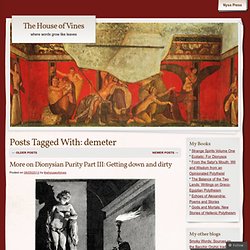
“They had come up to Sardis with Onomakritos, an Athenian diviner who had set in order the oracles of Mousaios. They had reconciled their previous hostility with him; Onomakritos had been banished from Athens by Pisistratos’ son Hipparchos, when he was caught by Lasos of Hermione in the act of interpolating into the writings of Mousaios an oracle showing that the islands off Lemnos would disappear into the sea. Because of this Hipparchos banished him, though they had previously been close friends. Now he had arrived at Susa with the Pisistratidae, and whenever he came into the king’s presence they used lofty words concerning him and he recited from his oracles; all that portended disaster to the Persian he left unspoken, choosing and reciting such prophecies as were most favorable, telling how the Hellespont must be bridged by a man of Persia and describing the expedition. [with?]
…. View topic - Back to Basics – Lincoln’s Pentacle of Mountains. Arcadia is a utopian world of bliss reminiscent to the golden ages of Islam, Hinduism the Kingdom of heaven of Christianity 'and the Elysian Fields in Greek mythology, the resting place of virtuous and heroic souls.
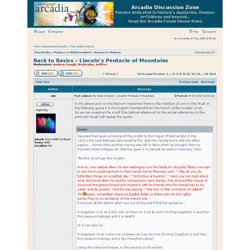
Arcadia in Greek MythologyThe Greek poet Hesiod 8th century B.C, wrote about life in Arcadia : “They lived like gods without sorrow of heart, remote and free from toil and grief, miserable age rested not on them; but with arms and legs never failing they made merry with feasting beyond the reach of all evils.When they died, it was as though they were overcome with sleep, and they had all the good things; for the fruitful earth unforced bore them fruit abundantly and without stint.They dwelt in ease and peace upon their lands with many good things, rich in flocks and loved by the blessed Gods”.In Greek mythology Arcadia is the realm of Pan the Greek horned God with the hindquarters of a goat .
Elysium Famous inmates The DanaidesIxionSisyphus TantalusThe TitansTityus Prayers. The Arcane Archive - Neo-Paganism and the Church of All Worlds, Some Questions and Answers, Part 2 of 2.